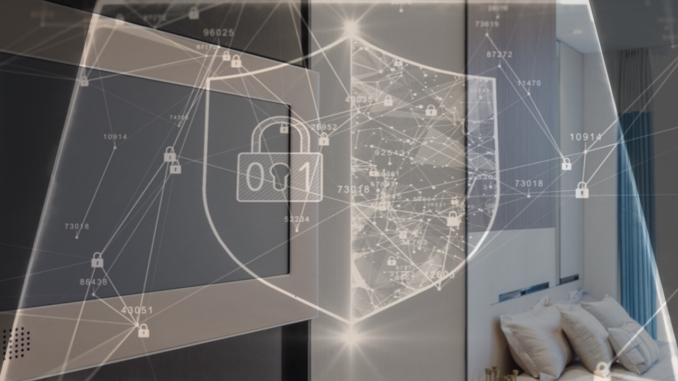
6.9.2024
The leading authority in benchmarking best practices in technology-enabled business initiatives in the hospitality sector has released a new research report titled IoT Security: Best Practices of Top-Performing Hotels and Resorts. Independently produced by Starfleet Research, with underwriting support from global cybersecurity leader Palo Alto Networks, the report provides an in-depth analysis of the current state of IoT security in the hotel industry and offers actionable recommendations for enhancing protection against IoT-based threats.
Twenty-five pages in length, and based on the experiences of more than 350 hoteliers and other industry professionals, the report, which is now available for complimentary download, reveals that hotels and resorts are increasingly integrating IoT devices to enhance operational efficiency and guest experiences. Notably:
- 64% of hotels have deployed energy management solutions, connected lighting, and water monitoring applications to improve energy efficiency and reduce waste.
- 76% of hotels have implemented IoT technology for smart guest engagement and security systems.
However, this growing reliance on IoT devices has led to a surge in security concerns:
- 83% of hotels have experienced one or more security breaches related to their IoT devices in the past three years, according to various sources.
- 95% of hoteliers cite financial loss, customer data theft, brand reputational damage, and operational disruptions as top concerns related to cyber attacks via IoT devices.
The report highlights a significant gap in confidence among hoteliers regarding their ability to safeguard IoT devices:
- Only 35% of hoteliers are “very confident” in their ability to safeguard the IoT devices on their networks.
- 42% of hoteliers acknowledge being “somewhat unconfident” or “not at all confident” in their current ability to safeguard against IoT security threats.
Despite recognizing the severity of the problem, many hotels are not adequately addressing the risks:
- Only 31% of hoteliers have “complete visibility of all devices, including quick and accurate discovery of previously unseen and unmanaged devices.”
- 73% of hoteliers cite the “complexity of [their] IoT ecosystem” as a top challenge when it comes to improving their IoT security capabilities.
- 76% of hoteliers cite “technology shortcomings of [their] current security solution(s)” as a top challenge their organizations face in securing their IoT devices.
- 78% of hoteliers say their organizations lack IoT security technology that utilizes “network segmentation by least privileged trust zones following the Zero Trust security principles.”
 As IoT technology continues to evolve, the report highlights the transformative potential it holds for the hotel industry, while also cautioning against the serious risks posed by unsecured networks. Hoteliers are urged to prioritize next-generation IoT security capabilities to safeguard their valuable assets and maintain guest trust. “Traditional cybersecurity tools often fail to detect malicious activities targeting IoT devices, necessitating the implementation of dedicated IoT security solution,” said Mariana Rosen, lead research analyst. “These solutions must provide full visibility into all network-connected IoT devices and utilize machine learning to detect vulnerabilities and suspicious activities.”
As IoT technology continues to evolve, the report highlights the transformative potential it holds for the hotel industry, while also cautioning against the serious risks posed by unsecured networks. Hoteliers are urged to prioritize next-generation IoT security capabilities to safeguard their valuable assets and maintain guest trust. “Traditional cybersecurity tools often fail to detect malicious activities targeting IoT devices, necessitating the implementation of dedicated IoT security solution,” said Mariana Rosen, lead research analyst. “These solutions must provide full visibility into all network-connected IoT devices and utilize machine learning to detect vulnerabilities and suspicious activities.”
The report also emphasizes the importance of understanding the context of IoT devices on a network to ensure adequate protection. It details the challenges posed by unknown IoT security threats, such as zero-day vulnerabilities, and the necessity of deploying purpose-built solutions that provide comprehensive visibility, risk analysis, and enforcement of risk-based policies. “To future-proof their networks, hotels must adopt scalable cloud-based IoT security solutions that utilize the latest technologies, including virtualization and trusted IoT approaches,” said Rosen.
Research for this report is based on qualified responses to an online survey conducted in Q1 2024, capturing the perspectives of 372 qualified respondents across the world and across various types and sizes of lodging properties. The respondents included hotel IT and cybersecurity leaders, IT staff, and other industry practitioners with firsthand experience in IoT security within their hotel organizations.
The new research report is the latest in a series on the topic of IoT security in the context of different industry sectors produced by Starfleet Research, the IT market research arm of Starfleet Media, in partnership with Palo Alto Networks, which provides next-generation cybersecurity solutions to thousands of customers across all sectors, including the hospitality industry.
Other titles in the series include:
- IoT Security: Best Practices of Top-Performing Organizations in the Public Sector
- IoT Security: Best Practices of Top-Performing Organizations in Retail
- IoT Security: Best Practice of Top-Performing Organizations in Healthcare (coming soon)
Click here to access IoT Security: Best Practices of Top-Performing Hotels and Resorts
Starfleet Research is a world leader in benchmarking best practices in technology-enabled business initiatives. Our research reports, focusing on how companies can maximize performance and achieve their desired objectives with respect to specific technology-enabled business initiatives, are read by thousands of industry practitioners and others around the world. Our digital content assets, including our Smart Decision Guides, are widely considered to be the most authoritative industry resources for IT decision makers charged with evaluating and making technology purchases.
Does your company have news it would like to share with our readers? If so, we invite you to review our editorial guidelines and submit your press release for publishing consideration.
